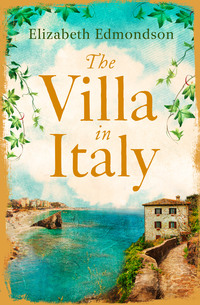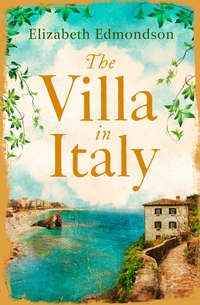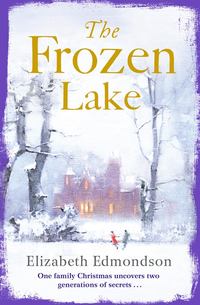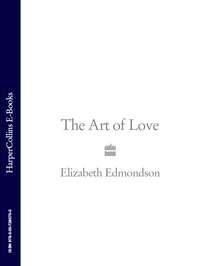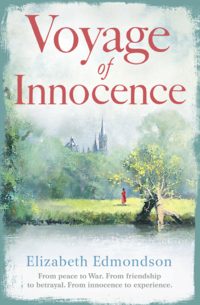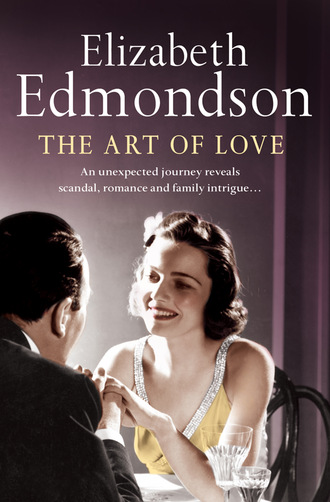
Полная версия
The Art of Love

ELIZABETH EDMONDSON
The Art of Love

COPYRIGHT
This novel is entirely a work of fiction. The names, characters and incidents portrayed in it are the work of the author’s imagination. Any resemblance to actual persons, living or dead, events or localities is entirely coincidental.
HarperCollinsPublishers Ltd. 1 London Bridge Street London SE1 9GF
www.harpercollins.co.uk
Published by HarperCollinsPublishers 2008
Copyright © AEB Ltd
Elizabeth Edmondson asserts the moral right to be identified as the author of this work
A catalogue record for this book is available from the British Library
All rights reserved under the International and Pan-American Copyright Conventions. By payment of the required fees, you have been granted the non-exclusive, non-transferable right to access and read the text of this ebook on-screen. No part of this text may be reproduced, transmitted, down-loaded, decompiled, reverse engineered, or stored in or introduced into any information storage and retrieval system, in any form or by any means, whether electronic or mechanical, now known or hereafter invented, without the express written permission of HarperCollins ebooks
This book is sold subject to the condition that it shall not, by way of trade or otherwise, be lent, re-sold, hired out or otherwise circulated without the publisher’s prior consent in any form of binding or cover other than that in which it is published and without a similar condition including this condition being imposed on the subsequent purchaser.
HarperCollinsPublishers has made every reasonable effort to ensure that any picture content and written content in this ebook has been included or removed in accordance with the contractual and technological constraints in operation at the time of publication
Source ISBN: 9780007223787
Ebook Edition © SEPTEMBER 2008 ISBN: 9780007283705
Version: 2019-01-17
DEDICATION
For Rosie Buckman
With love and gratitude
CONTENTS
Title Page
Copyright
Dedication
PART ONE
ONE
TWO
THREE
FOUR
FIVE
SIX
SEVEN
EIGHT
NINE
TEN
ELEVEN
TWELVE
THIRTEEN
FOURTEEN
FIFTEEN
SIXTEEN
SEVENTEEN
EIGHTEEN
NINETEEN
TWENTY
TWENTY-ONE
TWENTY-TWO
TWENTY-THREE
TWENTY-FOUR
PART TWO
TWENTY-FIVE
TWENTY-SIX
TWENTY-SEVEN
TWENTY-EIGHT
TWENTY-NINE
THIRTY
THIRTY-ONE
THIRTY-TWO
THIRTY-THREE
THIRTY-FOUR
THIRTY-FIVE
THIRTY-SIX
THIRTY-SEVEN
THIRTY-EIGHT
THIRTY-NINE
FORTY
FORTY-ONE
FORTY-TWO
FORTY-THREE
FORTY-FOUR
FORTY-FIVE
FORTY-SIX
FORTY-SEVEN
FORTY-EIGHT
FORTY-NINE
FIFTY
FIFTY-ONE
FIFTY-TWO
FIFTY-THREE
STOP PRESS
Keep Reading
About the Author
By the Same Author
About the Publisher
ONE
‘If I’m not Polly Smith, then who am I?’
‘What a profound question,’ said Oliver Fraddon.
The two of them were standing side by side in a gallery at Somerset House, home of the Register of Births, Marriages and Deaths for all the counties of England.
‘The world in little, one might say,’ Oliver went on, looking along the floor-to-ceiling shelves filled with thousands of large red ledgers that contained the transitions of millions of lives, present and past. ‘All of us written down here, captured, immortalized. Volumes full of names and identities, A to Z, plain and extraordinary. We’re born, we marry — or some of us do — and we die, and each time we are set down on a page in here. A frightening thought.’
‘Never mind the frightening thought, what concerns me is that I’m not among those immortalized here,’ Polly said.
‘Very true. I suggest we go back to the desk and ask the recording angel for help.’
He led the way down the metal spiral staircase, warning Polly to watch her step. ‘Or you’ll end up as a new entry under Deaths.’
The clerk standing behind the long wooden length of the main counter had not a touch of the angelic about her. She wore pince-nez attached to a thin chain and had a harassed air. Oliver addressed her. ‘This young lady seems to have gone missing.’
The clerk looked at Polly with worried, faded grey eyes, eyes that were kinder than her pinched mouth. ‘Oh dear. Can’t find yourself? Not where you should be? Your name is Smith, you say. Well, there are rather a lot of Smiths, but in the end there’s only one of you. It comes down to having the right dates and the right address. Once we’re sure of that information, we can find you. Unless,’ she added, her voice sharpening, ‘unless you’re a foreigner.’
‘Do I look like a foreigner?’ Polly asked, indignant, not because she minded being taken for a foreigner, but because she wanted to assert her rightful place, numbered among all her fellow citizens here, in those large red books.
‘No, but if you were born abroad, even if you were as English as me and Mr Grier over there, then you wouldn’t be in the main part of the registry, but in the records we keep elsewhere.’
‘In the nether regions?’ suggested Oliver in Polly’s ear. ‘The brimstone section, with devilish clerks scurrying to and fro.’
‘It doesn’t arise,’ said Polly, ‘I was born in Highgate. 11, Bingley Street, off Archway. My mother still lives there. On May the first, 1908.’
‘Only there is no entry for her in the relevant volume,’ Oliver said.
The angel was impressed by Oliver, Polly could see that. If it had just been her standing at the desk, in her old mac and wine-coloured beret, she’d still be waiting for the clerk to look up from her card indexes and paper. It had been Oliver, every inch the gentleman in his tailored suit, who had commanded her immediate attention. Just by being there. It was unfair. But useful, she told herself. And of course, the minute he opened his mouth, there was the accent, proclaiming him a product of the upper classes, with all the easy authority that Eton and Oxford gave to the Olivers of this world.
So the woman in the pince-nez had been helpful. Had gone back with them to the red books, had found the one that should have contained the entry for Polly. ‘Polly’s short for Pauline,’ she told the woman, but it made no difference. There was no female Smith, initial P, born in Bingley Street, Highgate on the first of May, nor indeed at the end of April or the middle of May. There was a Thomas Smith, born in Priory Gardens on the second of May; that was as close as she could get.
The clerk closed the book, and Oliver courteously took it from her to replace it on its shelf.
‘You’ll have to get the correct details from your parents,’ the clerk said. ‘If you were born in a nursing home, perhaps in the country, you might have been registered there. I expect your father registered you, and he mightn’t have realized he should have done it where you lived, and not where you were born. Ask him.’
‘I can’t, he’s dead.’
‘In the war?’ the clerk said, with a sudden and unexpected flash of sympathy. ‘I’m sorry. But your mother will know. And doesn’t she have the original certificate?’
‘Good question,’ Oliver said, as they came out of the grandeur of Somerset House into the noise and bustle of the Strand. ‘That would solve all your problems.’
Polly grinned. ‘I dare say in your stately home everything is in perfect order, but Ma’s not very organized with papers. They’re stowed away in boxes, only not so you can find anything. She takes care with her music, she can always find a piece of music she wants. Papers are different, and after all, it was more than twenty years ago. I asked her, of course I did, but she got into such a fret, positively alarmed when I said I’d look through all her stuff, that I thought it would be easier just to come here and get a copy. They don’t need the original for a passport, do they?’
‘A copy from Somerset House passes all scrutiny,’ said Oliver. He drew her to the side, out of the way of passers-by. ‘So what now? Honeymoon cancelled? Come to think of it, wedding off, I’m sure you need a birth certificate to get married.’
‘The wedding isn’t cancelled, because no date has been fixed. Just January.’ Which was now only a few weeks away. ‘Roger told me to see to the passport so that there wouldn’t be any hold-ups. He likes to be ahead of himself. And what I’m going to do now,’ she said, suddenly decisive, ‘is catch a tram and go home and interrogate my mother.’
‘Then I shall escort you to the tram stop.’
They walked along the Strand towards Aldwych, Polly thinking, Oliver watching her. A pigeon landed in front of them and then took off with a whirr, the colour and shape of the grey wings catching Polly’s eye. Grey, but so many shades of it, from almost white to rich purple. And the energy of the movement, effort blending into the smooth ease of flight.
A grey bird on a grey day, but the dismal skies above them had no colour nor shape nor energy. There was the hint of sulphur in the air that warned of approaching fog; the crisp autumn days of October were over and now London had descended into the sullen dreariness of a damp and cold November.
‘The dark days do make me miserable,’ Polly said, as they crossed the road. ‘I spend most of the winter pining for spring and longer days. I never feel really happy in the winter. It’s the cold and the general dimness, I suppose.’
Polly and Oliver went down the steps to the tram station at Aldwych. Oliver took her hand and kissed it, as was his habit, then saw her on to the waiting tram, raising his hat as she climbed on. Oliver always wore wide-brimmed hats in soft browns and greys. She ran up the stairs to the upper deck and snatched a window seat from a burly man with a brown parcel. As the tram rattled off and emerged into Kingsway, she saw Oliver walking back towards Aldwych. Among the hurrying crowds, heads down, faces red from the cold, clad in drab coats and suits, his exquisitely tailored figure and hat made him stand out, as did his languid stride.
The tram plunged underground into Kingsway tunnel.
Polly both loved and hated trams. The clatter and banging and restless swaying disturbed her, but there was a comfort in travelling on a vehicle that ran on its tracks so purposefully and undeviatingly through the chaos of all the thick London traffic. And this particular tram, the Number 35, was part of her life. She had travelled on it every school day to and from her school, and then later on, when she won a scholarship to art school, had ridden on it into the heart of London to her college.
The journey to her old home took forty-five minutes, through the streets of northern London and up into Highgate. She got off at Archway, just as she always did; she could have walked blindfold from the tram stop to her house, and in fact, more than once, going home in a bad fog, she might as well have been blindfolded.
Polly hoped that they weren’t in for one of those terrible pea-soupers, which caught in your throat and always made her feel sick and headachy. She loathed the days when it was as if the sun never rose, and the sounds of London — traffic, voices, street criers, bells — were muffled by the smoke-laden, noxious greenish-yellow air.
She walked along Bingley Street to number 11, pushed open the gate and climbed the steps up to the front door, which was painted a dark green colour and sported a brass knocker in the shape of a pixie. From the window to the right of the front door, she heard the wavering sounds of a piano scale. Her mother had a pupil. She looked at her watch. Ten to five, so the lesson would probably finish in ten minutes. The front door was on the latch, and she opened and shut it behind her quietly. Inside, she took off her mac and beret, unwound her woolly scarf and hung them up on the hook behind the door. Then she walked down the hall and into the kitchen, warm from the stove which her mother kept going all the time in winter. She put the kettle on, and sat down at the scrubbed wooden kitchen table, her feet automatically curling round the legs of the chair as they had done since she was a little girl.
The kitchen overlooked their small garden, a constant affront to the neighbours, whose neat herbaceous borders, squares of lawn and regimented vegetable patches tucked away at the bottom of each matching garden proclaimed the right horticultural instincts. The garden was the one place where Dora Smith’s restrained nature seemed to give way to something more reckless. She packed the space with plants, not in neat lines, but more, Polly always liked to imagine, as a jungle would be. Dense and profuse, and nothing small except the soft swathes of violas and the snowdrops which nestled under the overhanging branches of shrubs and bushes.
But no London garden looked inviting in November. It had a forlorn, end-of-season look to it. The piles of crisp autumn leaves had vanished, leaving just a few soggy remnants on the ground or clinging to the twigs of the trees. The evergreens added a touch of colour and life, but even they had a grey tinge, as though the misty air had got to them as well.
The kettle came to the boil in a flurry of steam. Polly warmed the brown teapot, spooned in the tea, and left it on the stove to brew. The door to the front room opened: voices, thanks and goodbyes, the front door opened and shut, and Polly’s mother came into the kitchen.
‘I heard you come in,’ she said. ‘You’ve made tea.’
‘Have you got a five o’clock?’
‘No. I should have, little Sally Wright, but she has a bad chest, and she isn’t allowed out when the weather’s like this. Just as well, for if she did come, it would be half an hour of cough, cough, cough. She’s a musical child, though,’ she added, wanting to be fair. ‘But I’ve another pupil at half past. Pour the tea, Polly. Do you want a biscuit?’
Polly took a biscuit and chewed it absent-mindedly, for a moment at a loss as to how to broach the subject of the birth certificate.
Then she plunged in, what was the point in beating about the bush? ‘I went to Somerset House today, to get a copy of my birth certificate.’
Dora Smith put her cup down so hard that it rattled the saucer.
‘You aren’t still set on going abroad for your honeymoon, are you?’ she said. ‘I don’t advise it, you’ll catch some dreadful disease, it’s not very clean over there.’
‘How do you know? You said you’d never been abroad,’ Polly said, rather crossly.
There was a pause. ‘My…It’s what people say happens to everyone who goes. And you don’t speak any foreign languages, at least if you do, your French teacher never found out about it, your French reports were always shockers.’
‘Roger speaks German and French. Besides, even if we weren’t going abroad, I have to have the birth certificate to get married. That’s what he says.’
‘I really do not see why you’re in such a rush to get married. Roger still has to finish qualifying, and — ’
‘He is qualified.’
‘Then why is he taking more exams?’
‘You have to, if you want to be a hospital doctor.’
Polly felt she hadn’t got to the bottom of her mother’s ambivalent attitude to Roger and her engagement. Dora Smith was a woman with two distinct personalities. The one Polly knew best was the sensible, practical woman, who shared her neighbours’ attitudes and opinions, among which was the certainty that the main purpose of a young woman’s being was to find herself a good, reliable husband, in a respectable way of life, and settle down with him to be a good wife and mother. Within this conventional scenario, Roger was a gem. A doctor was better than the daughter of Ted and Dora Smith might have hoped for, and a catch to brag about to her friends, if Dora were given to bragging, which she wasn’t.
But Dora Smith had another side, the side that had been dismayed at Polly’s precocious artistic talent, that had refused to praise her exceptional promise, yet who had fiercely asserted the need for Polly to do her art as well as she could. ‘If you’re an artist, then you have to be trained properly, to become as good as you can be. It’s not the same as having art as a hobby. One’s professional and the other’s amateur.’ And it was that Dora Smith who had said, clearly and unexpectedly, ‘If you marry Roger, the light will go out of your painting.’
To which Polly might have replied that the light had already gone out of her painting, and so what difference would it make, but that wasn’t an acknowledgement she was going to make to anyone.
‘Can we get back to the birth certificate? Are you sure you can’t find the original? I don’t see how it can be lost, one doesn’t lose something important like a birth certificate.’
Dora Smith didn’t answer, but took a sip of tea, her gaze wandering away from Polly as she looked out of the window. The clock ticked, the stove gave its familiar creaking sound as it cooled, the cat flap on the back door rattled and a large tabby cat slid through it. He gave Polly an uninterested look with his round, golden eyes, swished a stripy tail and went to investigate his food plate.
Still Dora said nothing.
‘I’m not there, in Somerset House,’ Polly persisted. ‘There’s no Pauline Smith registered, not on that date, not anywhere in Highgate. Was I born somewhere else? In a nursing home?’
Her mother sighed, and Polly saw that her eyes, when she looked back from the window, had a glisten of tears in them.
‘Ma, I’m sorry. What is it? What’s the matter?’
The words came out in a rush. ‘You weren’t born in Highgate, you were born in Paris. I haven’t lost your birth certificate. I burnt it.’
‘Burnt it?’ Polly couldn’t believe her ears. ‘Burnt it? Why? When? Just to stop me going abroad? And how could I possibly have been born in Paris? You’ve never been to France, you said so yourself.’
‘I burnt it when you were a baby,’ said Dora Smith, with a sigh. ‘Oh, dear, why did this wretched man want to take you abroad. Or marry you at all? Bringing it all up. I had hoped…’
‘You had hoped what?’ Polly felt a cold sensation in her stomach. Paris?
‘You’ll need all the details if you really must have a passport. I’ll write them down for you.’
Polly watched her mother as she got up and went to the drawer where she kept scraps of paper. She smoothed out the back of an envelope, and wrote in her clear italic hand. Then she passed it to Polly, and went over to stand at the sink.
Polly stared down at the elegantly inscribed words.
‘This makes no sense,’ she exclaimed. ‘Who’s this — I can’t even pronounce it — this Polyhymnia Tomkins?’
‘That’s your real name,’ Dora said, leaning on the sink and running the tap, so that Polly had to raise her voice to be heard.
‘Tomkins? I’m Polly Smith. How can I ever have been called Tomkins? And Polyhymnia? That’s not even a proper name.’
‘I’m not your mother,’ Dora said. ‘And Ted Smith wasn’t your father.’
TWO
On the tram back into the centre of London, Polly sat unseeing, not noticing the people around her, or hearing the grumbles of two women in the next seat about the weather, not aware of the bell clanging, the swaying as the tram went over points, oblivious to everything outside herself, as she tried to make sense of what her mother — who was not her mother, after all — of what Dora Smith had told her.
What kind of a mother could she have been, this woman who had abandoned her so casually into the care of her sister when she was only weeks old, and never saw her again, who clearly didn’t care whether she were alive or dead?
What kind of a mother would call her daughter Polyhymnia?
‘Polyhymnia’s one of the muses,’ Dora Smith told her. ‘The muse of sacred song.’
Sacred song indeed. Well, no one could have been more wrongly named, because, to Dora Smith’s dismay, Polly had no ear for music at all. She had ground her way through piano lessons until both of them had given up with relief, and she couldn’t hold a tune; singing at school had been a case of miming and mumbling, under the constant frowns of the singing mistress.
Dora Smith had been less than forthcoming about her sister, Thomasina. That was another ridiculous name. ‘We went our separate ways,’ was all she would say. ‘We weren’t at all alike.’
‘Where is she? Is she still alive?’
‘I don’t know, and that’s the honest truth.’
‘How could you lose touch with a sister? If I had a sister…’
Which was an unkind thing to say. Of course, if she, Polly, wasn’t the Smiths’ daughter, then Dora Smith had never had children of her own. Polly had asked, when she was a little girl, why she didn’t have a brother or sister, and Ted had put down his newspaper and frowned at her, saying that wasn’t a suitable question to ask. Later, when she was in her bath, being soaped and flannelled from nose to toe by her mother, Dora Smith had said with a sigh that she wished Polly did have a little brother or sister, but fate had chosen for her to be an only child.
I couldn’t have had better parents, Polly told herself fiercely.
Dora Smith had said, with a world of sadness in her voice: ‘You are my daughter, Polly. You’re the only daughter, the only child I had. Ted loved you as if you were his own, and well, a niece is close. A sister’s child. You’re my blood, that counts for a lot.’
Only it didn’t seem to count sister to sister, not if Thomasina had walked out on her sister and her baby’s life with never a backward glance.
‘Why Paris?’ Polly wanted to know. ‘What was she doing in Paris?’
There it was again, Dora’s obvious reluctance to answer questions. ‘She was a bit of a gadabout, restless, never happy in one place. She had friends in Paris, I suppose.’
Illegitimate. Polly stared out into the chilly darkness, vaguely lit by the headlights of cars and streetlights gleaming dully through the thickening fog. She was illegitimate.
‘What you’re saying is that I’m a bastard,’ she had said, raging at Dora.
‘Don’t use that word. Not ever.’
‘It’s the word other people will use. Didn’t that ever occur to my mother?’
‘Your mother…your mother was an unconventional person. She wouldn’t — that is, what people in general might consider a stigma, wouldn’t be to her. I remonstrated with her when she arrived on our doorstep with you in her arms. I said she should marry your father, so that you wouldn’t have the disgrace of illegitimacy, but she said no healthy baby could be any kind of a disgrace.’
‘That was big of her.’
‘They’ll give you a short birth certificate at Somerset House,’ Dora said. ‘One that doesn’t have any blank spaces. Thomasina refused to fill in any details for your father.’
‘It was an English birth certificate, though? I am English?’
‘Of course you are,’ said Dora, shocked. ‘As English as a Chelsea bun. At least she had the sense to register you at the consulate there, that’s what you do, for English babies born abroad. Go back to Somerset House with those details I’ve written down, and they’ll find the entry all right.’
It was extraordinary to think that all these years she’d lived as Polly Smith, and in fact she was no such thing. Her passport would proclaim to the world that she was Polyhymnia Tomkins. A stranger. She couldn’t think of herself as any such person. Polyhymnia Tomkins was the fabrication, she was the person who didn’t exist, not Polly Smith.


